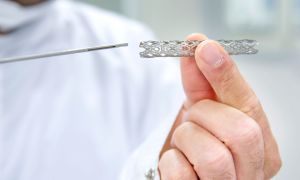Advertisement
There are a number of general guidelines to follow to make air travel safer and easier for people with implantable heart devices.
- Carry a copy of your medical history, a list of all the medications you are taking, a copy of your most recent EKG if it was abnormal, and an ID card that gives your device type, the device's manufacturer, and your healthcare provider’s contact information.
- Airport security gates do not appear to interfere with pacemakers or ICDs, but the metal in the devices---as well as in any artificial joints or other prostheses, may set off the alarm. Tell the security officers that you have a device, show them your device ID card (although this may not be necessary). Often, they will reroute you to another security officer for an individual check with a handheld wand or a hand search. The hand wand, which contains a magnet, theoretically could interfere with your device, so ask for a hand search to be safe. If the wand must be used, Medtronic, the company that makes many of the implantable heart devices, advises to ask that the handheld wand used for follow-up screening be kept away from the front of the chest as a safety precaution.
- If you need a pat-down, particularly if the pat-down is related to a medical condition, recent surgery, implant, or prosthesis, you have the right to ask for a personal screening in a private area. You have the right to have your medical condition remain confidential between you and TSA personnel during the screening process.
- Carry a copy of your medical history, a list of all the medications you are taking, a copy of your most recent EKG if it was abnormal, and an ID card that gives your device type, the device's manufacturer, and your healthcare provider’s contact information.
- Airport security gates do not appear to interfere with pacemakers or ICDs, but the metal in the devices---as well as in any artificial joints or other prostheses, may set off the alarm. Tell the security officers that you have a device, show them your device ID card (although this may not be necessary). Often, they will reroute you to another security officer for an individual check with a handheld wand or a hand search. The hand wand, which contains a magnet, theoretically could interfere with your device, so ask for a hand search to be safe. If the wand must be used, Medtronic, the company that makes many of the implantable heart devices, advises to ask that the handheld wand used for follow-up screening be kept away from the front of the chest as a safety precaution.
- If you need a pat-down, particularly if the pat-down is related to a medical condition, recent surgery, implant, or prosthesis, you have the right to ask for a personal screening in a private area. You have the right to have your medical condition remain confidential between you and TSA personnel during the screening process.
Continue Learning about Implantable Medical Devices For The Heart
Important: This content reflects information from various individuals and organizations and may offer alternative or opposing points of view. It should not be used for medical advice, diagnosis or treatment. As always, you should consult with your healthcare provider about your specific health needs.

